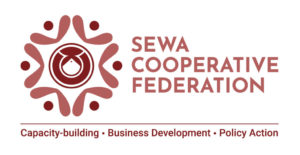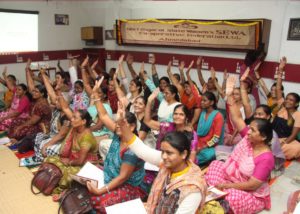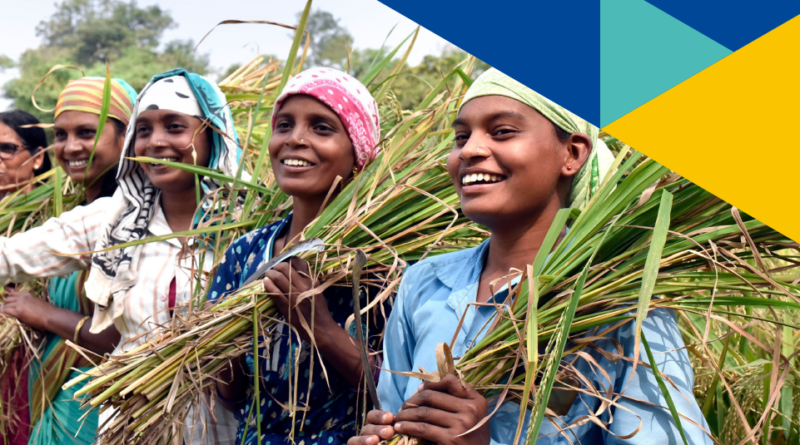ILO report – Strengthening women’s cooperatives: The experience of SEWA Cooperative Federation
20 August 2024
The International Labour Organisation (ILO) has just published a report on the challenges and opportunities faced by cooperatives and other social and solidarity economy entities in empowering women workers in the informal sector. The report focuses on SEWA Cooperative Federation’s, member of CICOPA, experience in using the cooperative model to support women’s collective enterprises across various sectors in India.
Indeed, the SEWA Cooperative Federation stands as a testament to the power of collective action and solidarity in empowering informal women workers. Through its comprehensive support services and adaptive strategies, the Federation not only strengthens cooperatives but also advocates for changes to create a more equitable and sustainable economy for all.
Background

The Self-Employed Women’s Association (SEWA) was founded in 1972 by Ms. Ela Bhatt as a union for informal women workers. SEWA’s primary goal was to secure recognition and rights for these women, treating them as legitimate workers, deserving of the same benefits as those in the formal sector. SEWA has continuously adapted its structure and services to meet the changing needs of its members and the external environment. The Gujarat State Women’s SEWA Cooperative Federation was formed in 1992 to strengthen and support the primary cooperatives that were increasingly developing.
During its first decade, the Federation focused on educating workers about the fundamentals of cooperatives, including values, structure, and ownership. This period was essential for empowering members to manage their own cooperatives effectively.
The Federation’s second decade saw a shift towards business planning, strategy development, and skill enhancement. This phase was marked by efforts to professionalize the cooperatives and ensure their sustainability.
In its third decade, the Federation responded to external changes and increasing competition by embracing technology and digitalization. The COVID-19 pandemic underscored the vulnerability of informal women workers, and SEWA played a vital role in crisis mitigation, helping women’s cooperatives) adapt to new market demands.
Supporting Women’s cooperatives

SEWA provides a range of services to support its member cooperatives, falling into five broad categories: capacity building, business strategy and growth support, research, communication, and incubation and revival.
Capacity Building
Training is a cornerstone of the SEWA’s support, covering leadership, cooperative governance, and specific skills like digital literacy and accounting. Training sessions are tailored to the needs of the cooperatives and often take place within the communities, making them accessible to all members.
Business Strategy and Growth Support
The Federation offers expertise in areas such as supply chain analysis, business planning, and marketing. It assists cooperatives in connecting with markets, reducing reliance on exploitative intermediaries, and supports online marketing efforts.
Financial Services
Access to finance is a significant barrier for cooperatives. The Federation provides working capital support and helps cooperatives develop business plans to secure loans. It also offers bookkeeping and legal services to ensure financial sustainability.
Research and Advocacy
The Federation engages in research to support policy reform and address the needs of cooperatives. It collaborates with various stakeholders to foster innovation and sustainability, advocating for better access to markets, financial resources, and capacity building.
Communication
To increase visibility and market access, the Federation assists cooperatives in developing communication strategies. It also enhances its own digital presence through social media and initiatives like the “In Solidarity” podcast, which addresses issues affecting informal economy workers.
Incubation and Revival
The Federation plays a crucial role in incubating new cooperatives and reviving inactive ones. This includes providing financial and marketing support, developing business strategies, and building the capacities of members and leaders.
Challenges, Learnings & Prospects for the Future
The Federation faced and is still facing several challenges, including limited visibility and understanding of its cooperatives’ needs among policymakers. Financial literacy and access to formal financial institutions remain significant barriers, as well as balancing the sense of solidarity with business mindset.
However, the Federation has learned the value of learning among cooperatives and the importance of an umbrella organization in providing legal support, visibility, and market connections.
In the future, SEWA will continue to advocate for a more conducive environment for cooperatives. The ILO’s Resolution on decent work and social and solidarity economy aligns with the Federation’s mission, highlighting the importance of transitioning from the informal to the formal economy and supporting care economy workers.
SEWA’s approach, sensitive to the context, natural resources, environment, and community needs, enables women to manage and own their enterprises. As the Federation moves forward, it remains dedicated to empowering women through cooperatives, ensuring their resilience and sustainability in an ever-changing world.
Read the full report here

